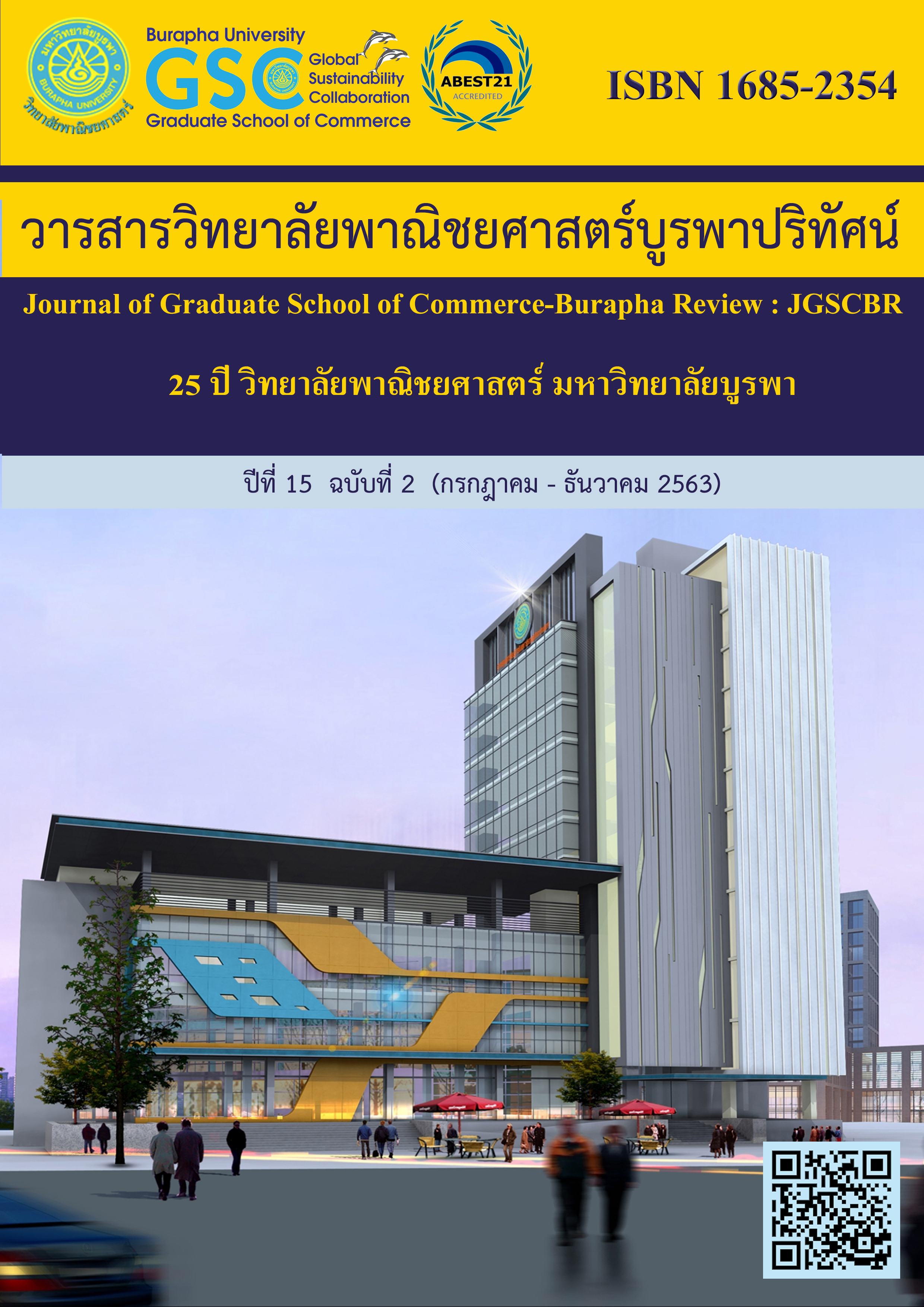MODEL HOTEL BASED ON THE LEARNING OF HIS MAJESTY'S PRINCIPLES
Main Article Content
Abstract
The study collects qualitative data by conducting in-depth interviews with the executives of four hotels which were once decorated by the Office of the Royal Development Projects Board Quantitative data is gathered from 18 experts and scholars using the Delphi Technique. Most of the respondent pool are male, over the age of 50, hold a bachelor’s or a master’s degree and have over 10 years of experience working on His Majesty the King’s working principles. The findings indicate that the model hotel for the learning of His Majesty the King’s working principles should: 1) apply acquired knowledge systematically; 2) nurture staff’s pride; 3) consistently hone staff’s observational skills in order for them to detect and solve problems quickly; 4) be committed to improving its work process and workflow; 5) promote its local identity; 6) implement a holistic approach to learn His Majesty the King’s working principles; 7) define its organizational structure as needed; 8) be economical with its use of resources; 9) streamline its service delivery so as not to affect the environment; 10) centralize its services; 11) operate on the principle that nature helps nature; 12) apply the “right the wrong” principle 13) foster staff and customers’ appreciation for nature; 14) share its resources with locals so as to improve their quality of live; 15) economize on its operational costs with self-reliance; 16) keep a balance between revenue and expenditure; 17) not invest beyond its financial capacity; 18) follow the administrative principle of self-sufficiency; 19) be honest, truthful and, sincere with customers and the local community; 20) work happily; 21) set goals together to create its own organizational culture and workplace.
Article Details
The owner of the article does not copy or violate any of its copyright. If any copyright infringement occurs or prosecution, in any case, the Editorial Board is not involved in all the rights to the owner of the article to be performed.
References
วัฒนชัย. กรุงเทพฯ: มูลนิธิสถาบันวิจัยและพัฒนาประเทศตามปรัชญาเศรษฐกิจพอเพียง
สำนักงานคณะกรรมการพัฒนาการเศรษฐกิจและสังคมแห่งชาติ.
ชาย โพธิสิตา.(2559). ศาสตร์และศิลป์แห่งการวิจัยเชิงคุณภาพ (พิมพ์ครั้งที่ 7). กรุงเทพฯ:อมรินทร์พริ้นติ้งแอนด์พับลิชชิ่ง.
ชูสิทธิ์ ชูชาติ. (2554). หลักการทรงงาน. เชียงใหม่: วนิดาการพิมพ์.
ธานินทร์ ศิลป์จารุ. (2560). การวิจัยและวิเคราะห์ข้อมูลทางสถิติด้วย SPSS และ AMOS (พิมพ์ครั้งที่ 17).
นนทบุรี: เอส. อาร์. พริ้นติ้ง แมสโปรดักส์.
พิชญากร กถญชรินทร์. (2558). Responsible hospitality-theory and practice. วารสารบริหารธุรกิจ
ศรีนครินทรวิโรฒ, 6(2), 152-157.
ภูมิหทัย กิตติพัฒนกุล. (2559). แนวทางการจัดการทรัพยากรป่าไม้อย่างมีส่วนร่วม กรณีศึกษาป่าชุมชนบ้านโคก
หัวข้าว จังหวัดฉะเชิงเทรา.วารสารวิจัยและพัฒนา ฉบับมนุษยศาสตร์และสังคมศาสตร์ มหาวิทยาลัย
ราชภัฎสวนสุนันทา,8(2), 74-77.
รัญจวน ประวัติเมือง. (2558). แนวทางการยกระดับภูมิปัญญา อัตลักษณ์ วัฒนธรรมล้านนา สู่การบริหารธุรกิจ
โรงแรมตามแนวคิดเศรษฐกิจพอเพียง. วารสารวิชาการสมาคมสถาบันอุดมศึกษาเอกชนแห่งประเทศไ(สสอท.), 21, 31-42.
ลลิต ถนอมสิงห์. (2557).หลักการทรงงานและองค์กรแห่งการเรียนรู้ นำไปสู่องค์กรแห่งความยั่งยืน.
วารสารวิชาการ คณะบริหารธุรกิจ มหาวิทยาลัยบูรพา, 9(1), 23-32.
สุภาภรณ์ ประสงค์ทัน. (2558).แบบจำลองเชิงพยากรณ์ความทุ่มเทใจของพนักงานโรงแรมในประเทศไทย.วารสาร
สังคมศาสตร์ มหาวิทยาลัยศรีนครินทรวิโรฒ, 18(2), 293.
สุเมธ ตันติเวชกุล. (2554). การทรงงานพัฒนาประเทศของพระบาทสมเด็จพระเจ้าอยู่หัว. กรุงเทพฯ: สำนักงาน
คณะกรรมการพัฒนาการเศรษฐกิจและสังคมแห่งชาติ.
สำนักงานคณะกรรมการพิเศษเพื่อประสานงานโครงการอันเนื่องมาจากพระราชดำริ (สำนักงานกปร.). (2559). แนวคิดและทฤษฎีการพัฒนาอันเนื่องมากจากพระราชดำริในพระบาทสมเด็จพระเจ้าอยู่หัว (พิมพ์ครั้งที่ 2). กรุงเทพฯ: อรุณการพิมพ์.
Wang, R. (2560). The investigation of Green Best Practices for Hotels in Taiwan. Procedia - Social
and Behavioral Sciences, 57, 140-145.


